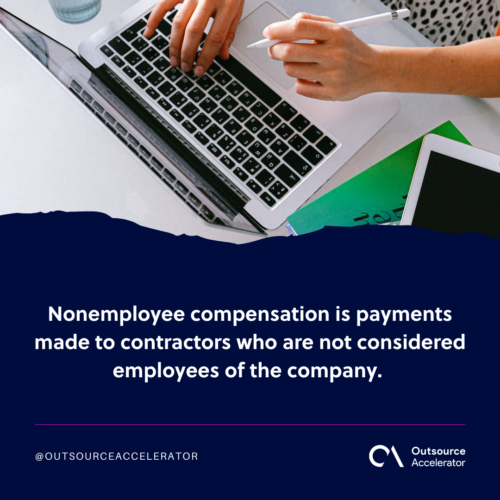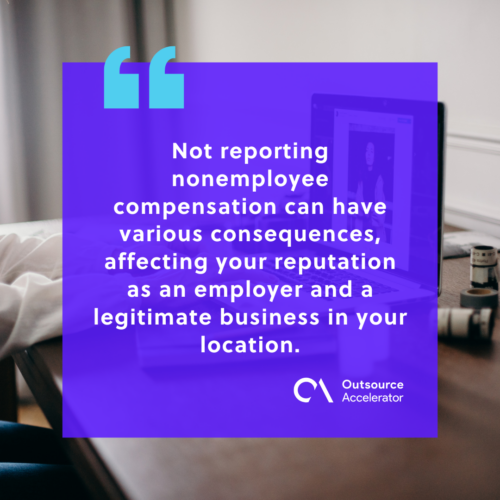What is nonemployee compensation, and how can you report it?

If you’re an employer or have hired independent contractors for your business, you may have encountered the term ‘nonemployee compensation.’
Nonemployee compensation is paid to independent contractors for their services. It differs from paying employee wages and may vary based on the rates agreed with the contractor.
As an employer, it is essential to understand the ins and outs of filing nonemployee compensation.
What is nonemployee compensation?
Nonemployee compensation is payments made to contractors who are not considered employees of the company. This compensation covers various work rendered, from freelance writing to ride-sharing.
These payments include fees, commissions, and other forms of compensation for their services. Compared to full-time employment, compensation for independent contractors does not usually cover benefits such as taxes, social security, and retirement.
There are different ways to file nonemployee compensation based on the regulations n a specific location. In the US, nonemployee compensation is reported on Form 1099-NEC.

Employee vs. Independent contractor: Who can receive nonemployee compensation?
The IRS determines which workers are independent contractors and employees.
A full-time employee works for the company and receives a salary or hourly wage. On the other hand, an independent contractor is self-employed and is hired by the company for their specialized services.
To further elaborate, the IRS defines the categories that determine this classification:
Behavioral factors
Behavioral factors determine the company’s level of control over how a worker works.
Employees often have specific guidelines and instructions for their work. They are subject to a higher degree of control from the employer, dictating how tasks are performed.
On the other hand, independent contractors maintain a certain level of autonomy. They have high flexibility in completing their tasks and work environment with minimal intervention from their employer.
Financial factors
Financial factors state the employer’s control over how workers are paid. Per the IRS, these financial factors are categorized into other aspects such as:
- Significant investment
- Opportunity for profit and loss
- Services available
- Payment method
Employees typically have a more predictable income structure. They receive regular paychecks, and the employer usually covers their expenses.
Independent contractors, meanwhile, bear a greater share of their business expenses. They can make a profit but also assume the bigger risk of financial loss.
Types of relationship
There are different types of relationships an employer may conduct with their workers:
- Independent contractor
- Full-time employee
- Statutory employee
- Statutory nonemployee
- Government worker
Employees often have a long-term commitment to the employer. They may receive benefits such as health insurance, retirement plans, and paid time off.
Agreements between the employee and employer are established in a written contract. This details several aspects, such as the duties and responsibilities to be performed, the employment duration, and the benefits the employees will receive.
Independent contractors, however, engage in a project-based relationship. Their association with the hiring entity is typically for specific projects.

How do you process nonemployee compensation?
Once you have determined which of your workers are eligible for nonemployee compensation, the next step is to process it throughout their work duration.
Below are the steps for processing nonemployee compensation:
Obtain necessary information from the independent contractor
Firstly, you must request information from the independent contractor. This includes their name, social security or taxpayer identification number, and contact information.
In the US, independent contractors must fill out Form W-9 stating these details. While you are not required to submit this to the IRS, this form helps you verify their identity.
Determine the total amount of nonemployee compensation paid
Calculate the total amount paid to the independent contractor for their services. This usually reflects the rates you agreed upon based on the services they rendered.
File the Form 1099-NEC if needed
The Form 1099-NEC is used to report nonemployee compensation that has been paid. This applies if you have paid your independent contractor at least US$600 or more for the year.
This form must be sent to the independent contractor by January 31st of the following year.
Submit the form to the IRS
Lastly, you must submit your form to the IRS along with Form 1096, which summarizes all Form 1099-NEC forms submitted. The deadline for submitting these forms is February 28th of the following year.
What are the consequences of not reporting nonemployee compensation?
Not reporting nonemployee compensation can have various consequences, affecting your reputation as an employer and a legitimate business in your location.

These include the following.
Fines and penalties
The IRS imposes fines and penalties for not reporting nonemployee compensation accurately. These penalties can range from hundreds to thousands of dollars depending on the severity of the violation.
Audits
The IRS may audit a business that has not reported nonemployee compensation accurately. This could lead to additional fines, penalties, and legal action.
Damaged reputation
Not reporting nonemployee compensation accurately can damage your reputation with independent contractors. As a result, you may have difficulties finding contractors for your future projects.







 Independent
Independent




